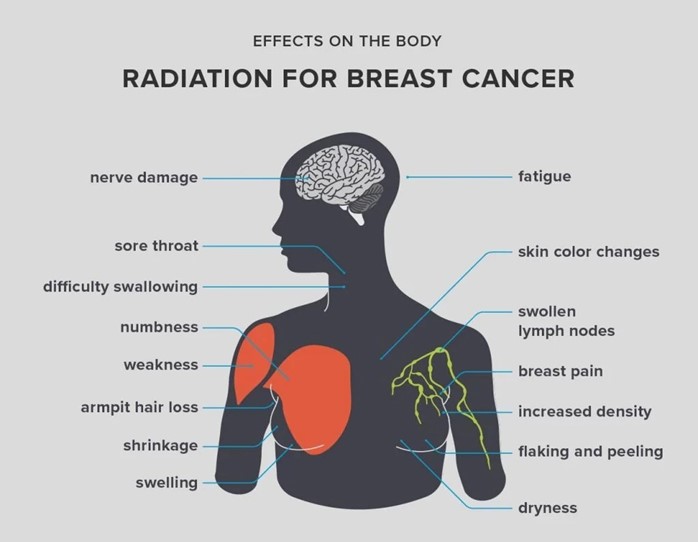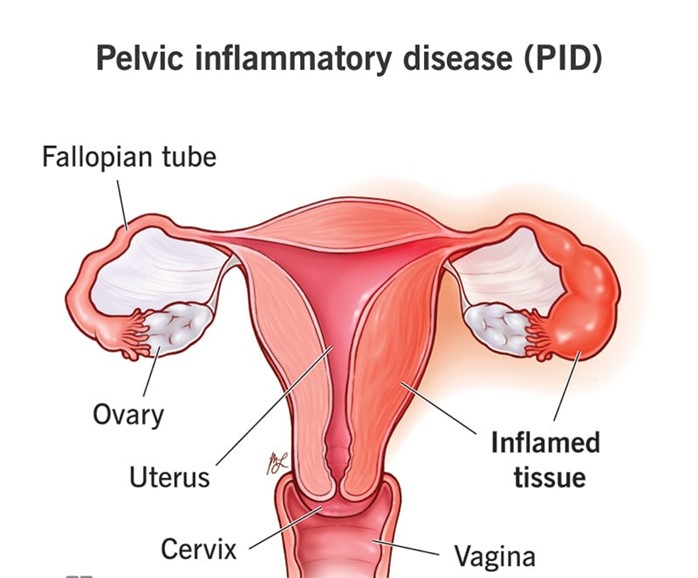A nurse is preparing a client for radiation treatment who is postoperative following a mastectomy. The nurse should inform the client to expect which of the following adverse effects from the treatment?
Diarrhea
Anorexia
Fatigue
Alopecia
The Correct Answer is C
Choice A: Diarrhea is not the correct answer because it is not a common adverse effect of radiation treatment for breast cancer. Diarrhea is a condition that causes loose, watery, or frequent stools. It can be caused by various factors such as infection, medication, or food intolerance. It is more likely to occur as an adverse effect of radiation treatment for cancers that affect the digestive system, such as colorectal or stomach cancer.
Choice B: Anorexia is not the correct answer because it is not a common adverse effect of radiation treatment for breast cancer. Anorexia is a condition that causes loss of appetite or interest in food. It can be caused by various factors such as depression, stress, or nausea. It is more likely to occur as an adverse effect of chemotherapy or other systemic treatments for cancer that affect the whole body.
Choice C: Fatigue is the correct answer because it is a common adverse effect of radiation treatment for breast cancer. Fatigue is a condition that causes extreme tiredness or exhaustion that is not relieved by rest or sleep. It can be caused by various factors such as anemia, inflammation, or pain. It is a common adverse effect of radiation treatment for any type of cancer, as radiation can damage healthy cells and tissues and affect the body's energy production.
Choice D: Alopecia is not the correct answer because it is not a common adverse effect of radiation treatment for breast cancer. Alopecia is a condition that causes hair loss or thinning on the scalp or other parts of the body. It can be caused by various factors such as genetics, hormones, or infection. It is more likely to occur as an adverse effect of chemotherapy or other systemic treatments for cancer that affect the whole body.

Nursing Test Bank
Naxlex Comprehensive Predictor Exams
Related Questions
Correct Answer is ["C","D","E"]
Explanation
Choice A reason: Baby oil is not an acceptable lubricant, as it can damage the condom and reduce its effectiveness. The students should use water-based or silicone-based lubricants instead.
Choice B reason: Ensuring a tight fit of the condom is not advisable, as it can cause discomfort and increase the risk of breakage. The students should leave some space at the tip of the condom to collect semen and prevent spillage.
Choice C reason: Only using latex condoms is correct, as they are more effective than other materials in preventing pregnancy and sexually transmitted infections. The students should avoid using condoms made of natural skin or lambskin, as they are porous and can allow viruses to pass through.
Choice D reason: Placing the condom on an erect penis is correct, as it ensures proper application and prevents slippage. The students should unroll the condom over the entire length of the penis before any sexual contact.
Choice E reason: Storing the condoms in a cool dry place is correct, as it prevents exposure to heat, moisture, sunlight, or sharp objects that can damage the condom. The students should check the expiration date and integrity of the condom before use.
Correct Answer is C
Explanation
Choice A: Ask the client's English-speaking family member to translate. This action is not appropriate because it may compromise the accuracy and confidentiality of the information. The family member may not have sufficient medical knowledge or vocabulary to translate correctly or may omit or alter some details due to personal bias or embarrassment.
Choice B: Use a translation dictionary to reinforce the teaching. This action is not appropriate because it may be time-consuming and ineffective. The translation dictionary may not have all the relevant terms or phrases or may provide inaccurate or ambiguous translations. The nurse may also lose the client's attention or interest by relying on the dictionary.
Choice C: Seek assistance from a facility-approved interpreter. This action is appropriate because it ensures the quality and clarity of the communication. The facility-approved interpreter is a professional who has the skills and training to provide accurate and unbiased translation of the information. The interpreter can also facilitate the interaction and feedback between the nurse and the client.
Choice D: Ask an assistive personnel (AP) who speaks the client's language to serve as an interpreter. This action is not appropriate because it may violate the scope of practice and ethical standards of the AP. The AP may not have the qualifications or authority to provide interpretation services or may have a conflict of interest or role confusion with the client. The AP may also have other duties or responsibilities that may interfere with the interpretation process.

Whether you are a student looking to ace your exams or a practicing nurse seeking to enhance your expertise , our nursing education contents will empower you with the confidence and competence to make a difference in the lives of patients and become a respected leader in the healthcare field.
Visit Naxlex, invest in your future and unlock endless possibilities with our unparalleled nursing education contents today
Report Wrong Answer on the Current Question
Do you disagree with the answer? If yes, what is your expected answer? Explain.
Kindly be descriptive with the issue you are facing.
